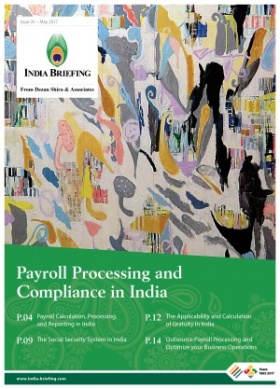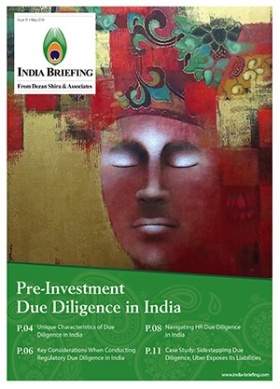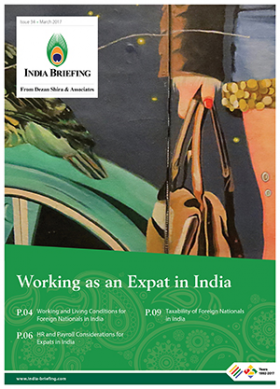India-France Relations: Growing Prospects in Renewables, Manufacturing following Macron Visit
French President Emmanuel Macron landed in Delhi late last Friday – to a warm reception by Prime Minister Narendra Modi. The move is a marked departure from the recent Canadian official visit, almost a statement of India’s strong ties with France.
Macron’s three-day visit saw him co-host the founding summit of the International Solar Alliance (ISA); France will commit US$924 million (€750 million) to the alliance, its total monetary contribution standing at US$1.23 billion (€1 billion).
ISA is an inter-governmental organization launched by Modi in 2015 that aims to mobilize US$1 trillion in funds for future solar generation, storage and technology across the world. It has 60 signatories, 30 of whom have ratified the agreement.
Other matters high on the agenda of the French president’s visit is cooperation in regional security in the Indo-Pacific, and balancing China’s rise and influence in Asia.
Besides a public commitment to assisting India’s renewable energy aspirations, France and India inked multiple deals over the weekend, ranging from defense, security, and civil nuclear cooperation to agreeing to hold biennial summits between top-level leaders of both countries.
The two countries also discussed annual ministerial talks to deepen trade and investment; France currently contributes only one percent to India’s foreign direct investment (FDI) yearly inflow.
In light of Macron’s visit – French cement giant Vicat announced US$274.82 million (€223 million) in investments in the Indian cement sector involving both brownfield expansions (Karnataka state) and greenfield projects (Andhra Pradesh state). Indian and French companies and government entities also signed deals worth US$16.02 billion (€13 billion) in aviation, renewable energy, and waste management.

 Stepping up trade, commercial exchange
Stepping up trade, commercial exchange
France and India have set a trade target of US$18.48 billion (€15 billion) for goods by 2022. Both countries will encourage small and mid-cap companies to accelerate bilateral economic and commercial exchange.
In 2016, the total trade in goods between France and India was worth US$10.57 billion (€8.58 billion), registering an increase of 0.49 percent from 2015.
India’s exports to France declined more than 12 percent to reach US$5.75 billion (€4.67 billion) whereas French exports to India increased 23 percent, totaling US$4.80 billion (€3.90 billion).

France-India migration, mobility
In a boost to education and industry, the two countries signed a bilateral partnership agreement on migration and mobility. This will make student and professional movement between France and India easier by simplifying the conditions for entry and long term stay for both the countries.
Support for Make in India
France will also participate in India’s defense equipment manufacturing sector under the Make in India initiative. In 2016, India agreed to buy 36 Rafale fighter jets from France at a cost of US$8.93 billion, which includes provisions for the transfer of technology and know-how.
In another significant development, French company Alstom announced the completion of its first electric locomotive at Madhepura, Bihar state. India’s railway sector has targeted 100 percent electrification, and this locomotive is part of a US$4.3 billion (€3.5 billion) deal for 800 electric double-section locomotives.
The Indian government’s public-private-partnership (PPP) with Alstom to modernize India’s railway structure was further bolstered during Macron’s visit with the announcement of three new contracts worth US$92.55 million (€75 million): a power supply contract from the Mumbai Metro Rail Corporation Ltd (MMRCL), new trains commissioned for the Chennai Metro Rail Corporation, and a power supply contract from the Jaipur Metro Rail Corporation.
Jaitapur civil nuclear plant
Slated to be the largest nuclear plant in the world, the joint French-Indian Jaitapur project in Maharashtra state will have a total installed capacity of 9.6 GW (gigawatt). It comes under India’s ongoing efforts to generate cost-effective electricity.
Work on the nuclear plant will start end of 2018; Macron and Modi asked respective private companies to ensure that their contractual discussions respect this timeline.
In their joint statement, France agreed to provide economic and competitive financing package for the plant while India will guarantee lifetime fuel supply. In addition, France will support India’s ambition for localized manufacturing capacity in this sector.
European partnerships after Brexit, China’s rise
India will continue to grow its business and trade ties with Europe in coming years.
Given the UK’s Brexit decision, industry watchers expect India will respond to the declining financial importance of London by diversifying ties with European countries, once Britain leaves the EU. This will include strengthening and expanding its bilateral relations with France, Germany, Italy, and other EU states.
The diminishing role of the U.S. in international politics, combined with the rise of China in the world economy, throws up multifaceted opportunities for Europe. The EU is increasingly developing business and commerce with U.S. sanctions-hit countries like Russia and Iran, but is also wary of a behemoth Chinese presence in Asia. India, on its part, continues to pitch its huge market, labor force, and manufacturing potential as an alternative to China in Asia.
Bradley Dunseith, International Business Advisory and French Desk, Dezan Shira & Associates, opines that “The MoUs signed between Macron and Modi are a clear rebuke to isolationist and anti-immigration polices gaining popularity across Europe and the United States. As India’s trade relationships with the UK and US can no longer be taken for granted, Macron’s India trip has elevated ‘Brand France’ while positioning French businesses to play a more proactive role in India’s rising GDP”.
Indo French Chamber of Commerce & Industry
Spread across India’s major metropolitan cities, the French Chamber of Commerce and Industry has four offices established in the country.
We provide the details below.
- Mumbai Office
French Bank Building
4th Floor, 62 Homji Street
Fort – Mumbai 400 001
Tel: + 91 22 6610 4755
Fax: + 91 22 6747 9760
Email: contact@ifcci.org.in - Delhi Office
DLTA Complex, RK Khanna Stadium, 1st Floor (Gate 3)
1, Africa Avenue
New Delhi 110 029
Tel: +91 11 3997 4690
Email: contactdelhi@ifcci.org.in - Chennai Office
Old 27, New 66, III Street,
Abiramapuram Chennai – 600 018
Tel: + 91 44 4217 8710
Email: contactchennai@ifcci.org.in - Bangalore Office
Unit 1303-1304, 13th Floor
Prestige Meridian II, No.30, MG Road, Bangalore 560 001
Tel: +91 80 6900 1218
Email: contactbangalore@ifcci.org.in
About Us
India Briefing is published by Asia Briefing, a subsidiary of Dezan Shira & Associates. We produce material for foreign investors throughout Eurasia, including ASEAN, China, Indonesia, Russia, the Silk Road, & Vietnam. For editorial matters please contact us here and for a complimentary subscription to our products, please click here.
Dezan Shira & Associates provide business intelligence, due diligence, legal, tax and advisory services throughout India and the Asian region. We maintain offices in Delhi and Mumbai and throughout China, South-East Asia, India, and Russia. For assistance with India investment issues or into Asia overall, please contact us at india@dezshira.com or visit us at www.dezshira.com.
- Previous Article India-Iran DTAA – A Step Forward in India’s Economic Engagement with Central Asia
- Next Article ¡India está que arde! Las nuevas ofertas públicas iniciales (IPO) se sobre suscriben de inmediato













